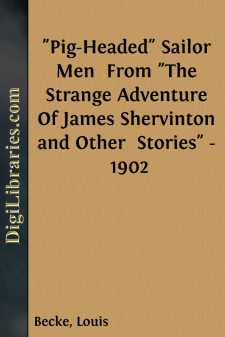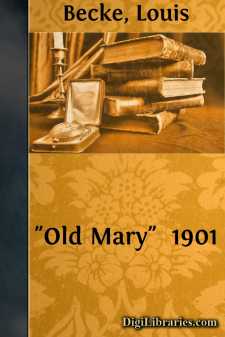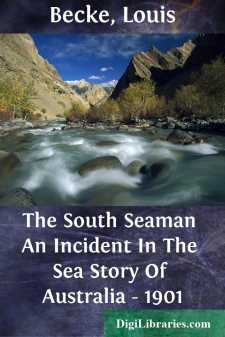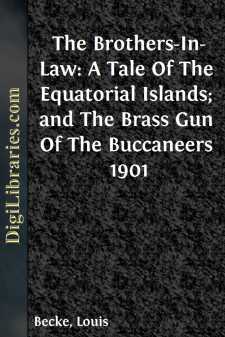Categories
- Antiques & Collectibles 13
- Architecture 36
- Art 48
- Bibles 22
- Biography & Autobiography 813
- Body, Mind & Spirit 142
- Business & Economics 28
- Children's Books 15
- Children's Fiction 12
- Computers 4
- Cooking 94
- Crafts & Hobbies 4
- Drama 346
- Education 46
- Family & Relationships 57
- Fiction 11828
- Games 19
- Gardening 17
- Health & Fitness 34
- History 1377
- House & Home 1
- Humor 147
- Juvenile Fiction 1873
- Juvenile Nonfiction 202
- Language Arts & Disciplines 88
- Law 16
- Literary Collections 686
- Literary Criticism 179
- Mathematics 13
- Medical 41
- Music 40
- Nature 179
- Non-Classifiable 1768
- Performing Arts 7
- Periodicals 1453
- Philosophy 64
- Photography 2
- Poetry 896
- Political Science 203
- Psychology 42
- Reference 154
- Religion 513
- Science 126
- Self-Help 84
- Social Science 81
- Sports & Recreation 34
- Study Aids 3
- Technology & Engineering 59
- Transportation 23
- Travel 463
- True Crime 29
Edward Barry South Sea Pearler
by: Louis Becke
Description:
Excerpt
CHAPTER I.
A wild, blustering day in Sydney, the Queen City of the Southern Seas. Since early morn a keen, cutting, sleet-laden westerly gale had been blowing, rattling and shaking the windows of the houses in the higher and more exposed portions of the town, and churning the blue waters of the harbour into a white seethe of angry foam as it swept outwards to the wide Pacific.
In one of the little bays, situated between Miller's Point and Dawe's Battery, and overlooked by the old-time Fort Phillip on Observatory Hill, were a number of vessels, some alongside the wharves, and others lying to their anchors out in the stream, with the wind whistling through their rain-soaked cordage. They were of all rigs and sizes, from the lordly Black Ball liner of a thousand tons to the small fore and aft coasting schooner of less than fifty. Among them all there was but one steamer, a handsome brig-rigged, black-painted and black-funnelled craft of fifteen hundred tons, flying the house flag of the Peninsular and Oriental Company. Steamers were rare in Sydney Harbour in those days (it was the year 1860), and the Avoca had pride of place and her own mooring buoy, for she was the only English mail boat, and her commander and his officers were regarded with the same respect as if they and their ship were the admiral and staff of the Australian squadron.
Leaning with folded arms upon one of the wharf bollards, and apparently oblivious of the driving sleet and cutting wind, a shabbily dressed man of about thirty years of age was looking, pipe in mouth, at the mail boat and the sailing vessels lying in the stream. There were four in all—the steamer, an American whaling barque, a small brig of about two hundred tons flying the Hawaiian Island colours, and a big, sprawling, motherly-looking full-rigged ship, whose huge bow ports denoted her to be a lumberman.
The man put his hand in his pocket and jingled together his few small remaining coins; then he turned away and walked along the wharf till he reached the side of a warehouse, the lee of which was sheltered from the wind and rain. He leant his back against the wall and again handled the coins.
"Seven shillings and two coppers," he said to himself, "and a waterman would want at least three shillings to pull round here from the Circular Quay in such nasty weather. No, Ted Barry, my boy, the funds won't run it. But that brig is my fancy. She's all ready for sea—all her boats up with the gripes lashed, and the Custom House fellow doing his dog-trot under the awning, waiting for the skipper to come aboard, and the tug to range alongside as soon as this howling gale takes off a bit. I'll wait here for another hour and watch for him."
Sitting under the lee of the wall, he again filled his pipe and began to smoke placidly, scanning with a seaman's eye the various vessels lying alongside the wharves.
Work had ceased for the day, the lumpers and longshore men had gone to their homes, and the usual idlers and loafers, which are always to be found in the immediate vicinity of shipping, or sitting about on the wharf stringers, fishing, had been driven away by the inclemency of the weather, or were gathered in small parties in the bars of the numerous public-houses near by....












